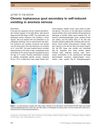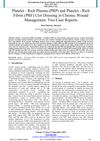 6 citations,
July 2011 in “British Journal of Dermatology”
6 citations,
July 2011 in “British Journal of Dermatology” A man with KID syndrome developed a rare cancer in a long-term skin infection.
 6 citations,
May 2010 in “The Journal of Dermatology”
6 citations,
May 2010 in “The Journal of Dermatology” A woman with anorexia developed gout from self-induced vomiting.
 6 citations,
December 1997 in “Journal of The American Academy of Dermatology”
6 citations,
December 1997 in “Journal of The American Academy of Dermatology” CTE can distort results in hair growth trials, so exclude it carefully.
5 citations,
August 2015 in “Sultan Qaboos University medical journal” Vitamin B12 deficiency can cause skin darkening and other symptoms, which improve with B12 supplements.
 4 citations,
May 1989 in “Journal of the Royal Society of Medicine”
4 citations,
May 1989 in “Journal of the Royal Society of Medicine” Crohn's disease can cause hair loss before other symptoms appear.
 3 citations,
May 2016 in “Dermatology Online Journal”
3 citations,
May 2016 in “Dermatology Online Journal” Changing estrogen levels during menopause might affect genes related to body rhythms and cause increased hair loss.
 3 citations,
February 2016 in “Pediatric dermatology”
3 citations,
February 2016 in “Pediatric dermatology” Strong skin creams work well for long-term scalp inflammation in Rapp-Hodgkin Ectodermal Dysplasia.
3 citations,
January 1996 in “Journal of Dermatological Treatment” The ointment is a safe, effective, and well-tolerated treatment for certain types of psoriasis.
 2 citations,
April 2022 in “Indian Journal of Dermatology, Venereology and Leprology”
2 citations,
April 2022 in “Indian Journal of Dermatology, Venereology and Leprology” Platelet-rich plasma is a promising and safe treatment for increasing hair density and thickness in women with chronic telogen effluvium.
2 citations,
February 2021 in “Journal of comparative pathology” Sheep with chronic Sarcoptes scabiei dermatitis have altered keratin expression in their skin.
 2 citations,
April 2018 in “Journal of Investigative Dermatology”
2 citations,
April 2018 in “Journal of Investigative Dermatology” The conclusion is that differentiating wound types in RDEB patients is important for clinical trials and understanding the disease.
 2 citations,
January 2014 in “Medical Principles and Practice”
2 citations,
January 2014 in “Medical Principles and Practice” The study suggests that people with rosacea are more likely to have chronic rhinosinusitis.
2 citations,
October 1999 in “The Journal of Urology”  2 citations,
August 1999 in “PubMed”
2 citations,
August 1999 in “PubMed” Chronic telogen effluvium is a condition that causes ongoing hair shedding.
 1 citations,
April 2023 in “American Journal of Clinical Dermatology”
1 citations,
April 2023 in “American Journal of Clinical Dermatology” Chronic telogen effluvium may not be a unique condition and could be confused with other types of hair loss.
 1 citations,
October 2022 in “Cureus”
1 citations,
October 2022 in “Cureus” Patients with chronic skin disorders often experience depression, anxiety, and reduced quality of life and may benefit from psychiatric help.
 1 citations,
June 2014 in “Serbian Journal of Dermatology and Venereology”
1 citations,
June 2014 in “Serbian Journal of Dermatology and Venereology” A woman with discoid lupus improved with treatment after being misdiagnosed with a different hair loss condition.
 1 citations,
January 2001 in “American Journal of Kidney Diseases”
1 citations,
January 2001 in “American Journal of Kidney Diseases” Hair loss in three Southeast Asian women with kidney failure may be linked to their anemia treatment with erythropoietin.
 December 2024 in “Asian Journal of Medical Sciences”
December 2024 in “Asian Journal of Medical Sciences” Low iron levels may be linked to hair loss in women with chronic telogen effluvium.
 December 2023 in “Tuberkuloz ve Toraks/Tüberküloz ve toraks”
December 2023 in “Tuberkuloz ve Toraks/Tüberküloz ve toraks” Many COVID-19 patients have long-term symptoms, especially women, but certain medications may help reduce these symptoms.
 December 2023 in “Alzheimer's & dementia”
December 2023 in “Alzheimer's & dementia” Finasteride may help reduce anxiety and depression in elderly but might cause depression in young men.
 September 2023 in “International Journal of Science and Research (IJSR)”
September 2023 in “International Journal of Science and Research (IJSR)” PRP and PRF can effectively heal chronic wounds.
 June 2023 in “Annals of the College of Medecine”
June 2023 in “Annals of the College of Medecine” Low iron levels are linked to more hair loss in women with chronic hair shedding.
 January 2022 in “Journal of family medicine”
January 2022 in “Journal of family medicine” Polycystic Ovarian Syndrome (PCOS) can cause chronic inflammation, mental health issues, and changes in gut bacteria, but a holistic lifestyle change can significantly improve these conditions.
December 2021 in “IP Indian journal of clinical and experimental dermatology” PRP therapy significantly improved hair growth in a girl with chronic alopecia areata.
 January 2021 in “American journal of dermatological research and reviews”
January 2021 in “American journal of dermatological research and reviews” The muscle damage was caused by T-cell large granular lymphocytic leukemia, not dermatomyositis.
November 2020 in “Research Square (Research Square)” Chronic scarring alopecia is common in SLE patients and needs early detection and management.
 April 2020 in “El-Minia Medical Bulletin”
April 2020 in “El-Minia Medical Bulletin” Low Vitamin D and its receptors might be linked to chronic hair loss in women.
September 2019 in “Journal of Investigative Dermatology” Vitiligo patients are willing to pay the most for treatment, regardless of disease severity.
 January 2019 in “Kocaeli tıp dergisi”
January 2019 in “Kocaeli tıp dergisi” People with chronic hair loss may have a higher chance of Vitamin B12 deficiency.























